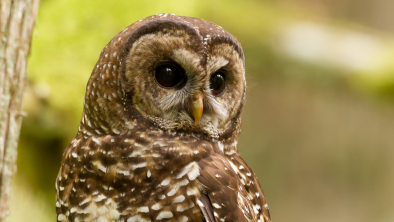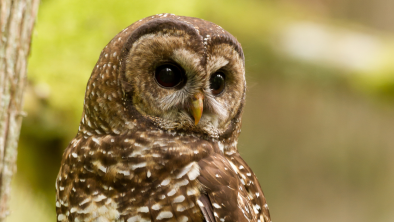Hunters fund wolf sterilization
Vancouver Sun
Scheme seen as a way to increase moose population in remote northern valley
Big-game hunters are bankrolling a provincial government plan to sterilize wolves and thereby increase moose populations in the Turnagain River Valley of northern B.C.
Biologists with the ministry of water, land and air protection have already radio-collared wolves in five packs in the Turnagain Valley, and hope to sterilize each pack's breeding alpha male and female as early as January.
Andy Ackerman, the ministry's regional wildlife manager in Fort St. John, said in an interview Tuesday that sport hunters and guide-outfitters in northern B.C. are contributing at least $30,000 to the experimental wolf-control program.
Yet he insisted the program is not meant to create more game for hunters to kill, rather to rebuild a moose population that has declined 90 per cent in the past decade. As wolves run short of moose, he added, they are also taking mountain sheep, caribou and other species.
"We're doing this to increase ungulate populations," he said, noting the research program will be monitored for its effectiveness. "They're taking a hit from wolf predation."
Provincial wildlife veterinarian Helen Schwantje said in Victoria that the dominant alpha male and female wolves will be darted from a helicopter and removed to a base camp to be sterilized through vasectomy or tubal ligation.
Both wolves will be returned to the point of capture as soon as they have recovered (a matter of hours or perhaps the next day) to rejoin their pack.
The remote Turnagain River flows into the Kechika Valley at the north end of the Rocky Mountain Trench. The ministry estimates 60-70 wolves live there.
The Turnagain project follows similar programs in the Yukon, Alaska, and in B.C. near Cariboo Lake, where biologists earlier this year quietly live-trapped and sterilized five wolves in a bid to protect endangered caribou.
The Vancouver Sun learned of the wolf sterilization by attending meetings in Mackenzie of the Muskwa-Kechika advisory board, a multi-stakeholder group that provides the province with management advice in a 6.3-million hectare wilderness in northern B.C.
Unable to reach consensus on the sterilization plan, the board rejected a request to match funding provided by three fish and game organizations -- the Northern B.C. Guides Association, the North Peace Rod and Gun Club, and the Northeast Wildlife Association.
A B.C. government Web-site boasts that "few places in the world can match the significance of the Muskwa-Kechika," an area of global significance that "remains one of North America's last true wilderness spots...." In 1997, when the province created the Muskwa-Kechika area, Prince Philip described the region as "the largest intact wilderness area south of the 60th parallel ... home to the most spectacular predator-prey system in North America."
Yet the sterilization of wolves has people asking how wild and natural the ecosystem is.
Board member George Smith, national conservation director for the Canadian Parks and Wilderness Society, said he is concerned that the technique remains scientifically unproven and wonders if anti-wolf factions in the ministry are behind the program.
"We turned it down," he said. "There's not a great acceptance that this is the way to go. As much as practical, a naturally functioning ecosystem should be allowed."
Other board members were not so reluctant, arguing predators must be controlled in a landscape in which humans have lived for thousands of years.
Barry Holland, a B.C. Wildlife Federation representative in Fort St. John, said resident hunters support the program to boost wildlife herds even though few locals actually make their way into the remote region to hunt. "It's a way to control wolves other than the tried-and-true system of blasting them with a gun," he said.
Al Baer, the Yukon's wolf-management coordinator, said from Whitehorse that the territory's sterilization program was launched in 1994 to protect caribou.
Once a pack is radio-collared, it is simple to monitor the wolves' behaviour to determine the dominant male and female. Then it's a matter of darting the male and performing a quick vasectomy.
"Bang, bang -- just like in a doctor's office. Then he's shooting blanks."
Sterilization of the alpha female is more invasive and time-consuming because it requires a tubal ligation.
Baer noted the program is less controversial than wolf-kill programs, and allows wolves to live out their lives in a relatively normal manner. "They maintain their dominance and hormonal balance, and defend their territories," he said.
Baer even went so far as to say biologists are doing wolves a favour because they won't have to hunt to feed hungry young. "Everyone wins, including the wolves. People feel the need to have children, but I don't think wolves do. Killing a moose takes a lot of wear and tear."
While sterilization is meant to boost game populations that might not otherwise recover, he agreed that human hunting contributed to the decline in the first place.
The biologist implementing the Turnagain program is John Elliott, the same person at the centre of a controversial program that killed more than 700 wolves in B.C.'s Northern Rockies in the 1980s. The province cancelled the program amid intense international criticism shortly before Expo 86, and resumed it in 1987 for one more year. Elliott did not return messages Tuesday.
© Copyright 2002 Vancouver Sun


